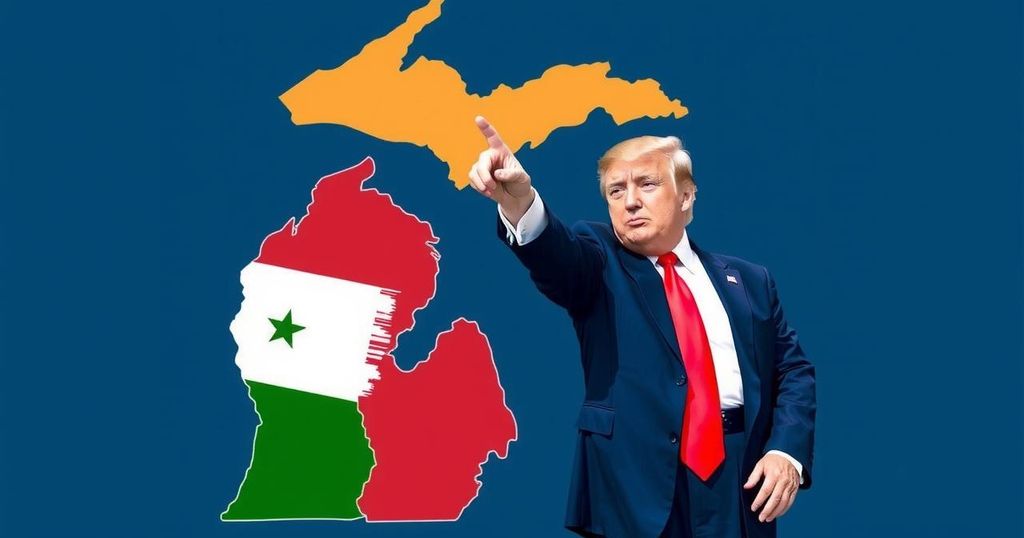The Shifting Political Landscape: Arab Americans’ Support for Trump in Michigan

Arab American voters in Michigan are increasingly leaning towards Donald Trump ahead of the upcoming U.S. elections due to dissatisfaction with the Democratic Party’s approach to the Israel-Palestine conflict. Activists in the community express frustration at being taken for granted by Democrats and see Trump’s outreach as a potential opportunity for change. Despite his controversial past, many believe his promises of peace in the Middle East offer a glimmer of hope compared to what they perceive as a guaranteed continuation of current policies under the Biden administration.
In recent months, there has been a notable shift in the political landscape among Arab American voters in Michigan, particularly in Dearborn, where many members of this community appear to be gravitating towards former President Donald Trump. This trend is largely attributed to dissatisfaction with the current administration’s stance on the ongoing Israel-Palestine conflict, especially the Biden administration’s unconditional support for Israel during its military actions in Gaza and Lebanon. Activists like Samraa Luqman express frustration at the Democratic Party’s historical neglect of the Arab vote, advocating for a political awakening within the community. “For too long, Democrats have taken the Arab vote for granted,” Luqman remarked, emphasizing the community’s discontent over the recent violence in Palestine. Her sentiment reflects a broader feeling among Arab Americans who see Trump’s overtures as a potential avenue for change, despite his past remarks that many find troubling regarding Muslims and immigrants. During a recent campaign event, Trump addressed thousands of Arab Americans, pledging to bring peace to the Middle East and recognizing the grievances of the community. Seeking to capitalize on the dissatisfaction with Democratic candidates, Trump has effectively tapped into the emotional landscape shaped by the war in Gaza, positioning himself as an alternative despite his previous record on Muslim-related issues. Support for Trump by Arab Americans appears complex. Business owner Albert Abbas articulated a growing frustration over political betrayal, urging Trump’s action on Gaza while acknowledging the long-standing issues under previous administrations. Likewise, local community members see Trump’s presidency as a time devoid of new conflicts abroad, fostering hope for potential peace efforts in the Middle East. Conversely, critics within the community remain skeptical. Sami Khaldi, a leader at the Dearborn Democratic Club, pointed out Trump’s historical actions against Muslim interests, reminding constituents of his administration’s policies, including the movement of the U.S. embassy to Jerusalem and the travel ban on several Muslim-majority countries. This has led to heated debates within the community regarding the implications of supporting a candidate who has historically marginalized their interests. Community leaders like Dearborn Mayor Abdullah Hammoud wrestle with this political pivot, asserting that Trump’s policies have only exacerbated division and suffering among Arab Americans. Nonetheless, the tangible discontent with the current administration is creating a rift that Trump is leveraging in his favor. The activity in Dearborn represents not just an electoral shift but a significant moment in the Arab American political narrative, as they seek to redefine their influence on a national scale.
The context surrounding Arab American voters in Michigan is defined by a growing disillusionment with the Democratic Party, especially in light of their steadfast support for Israel amidst the ongoing conflict in Gaza. Arab Americans, traditionally aligned with Democratic candidates, are reassessing their political affiliations as they respond to perceived negligence concerning their interests and grievances. Recent events, including military actions in Gaza, have intensified this reassessment, prompting many to consider the viability of Trump as an alternative, despite his controversial history. The dynamics of this political realignment reflect broader questions about representation, community agency, and the potential for a shift in voting patterns leading into the 2024 presidential election.
The emerging trend of Arab Americans in Michigan supporting Donald Trump marks a significant shift in the political landscape. Driven by anger towards the Biden administration’s policies on Israel and disillusionment with the Democratic Party, many within this community are seeking alternative representation. Activists argue that their vote should no longer be taken for granted and are willing to take risks with their political choices. As the elections approach, this movement underscores the potential power of the Arab American vote, while raising critical questions about the future direction of their political engagement and representation.
Original Source: www.aljazeera.com







